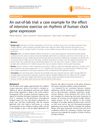19 citations,
June 2021 in “The world journal of men's health” Using anabolic-androgenic steroids can harm men's reproductive health and increase the risk of heart problems and death.
17 citations,
May 2020 in “Forensic Science International Genetics” Genetically variant peptides are reliable for forensic identification despite age-related changes in hair proteins.
11 citations,
January 2015 in “PubMed” A specific laser treatment can promote hair growth in mice by increasing certain protein levels.
 9 citations,
April 2019 in “Biomolecules & Therapeutics”
9 citations,
April 2019 in “Biomolecules & Therapeutics” Udenafil may help hair grow by activating certain stem cells.
 9 citations,
July 2018 in “Medicine”
9 citations,
July 2018 in “Medicine” Men with vertex baldness may have a higher risk of developing prostate cancer, but more research is needed to confirm this.
 6 citations,
May 2023 in “Drugs”
6 citations,
May 2023 in “Drugs” Baricitinib helps regrow hair in adults with severe alopecia better than a placebo and is approved for treatment, but long-term effects are still unknown.
 2 citations,
September 2020
2 citations,
September 2020 Long-term high testosterone levels can improve bone density and reduce body fat but may increase the risk of prostate cancer and high blood pressure.
1 citations,
January 2023 in “Science Advances” The skin's microbiome helps hair regrow by boosting certain cell signals and metabolism.

Drinking sweetened tea and soda and poor sleep may increase the risk of hair loss in women.
 September 2024 in “Journal of Cosmetic Dermatology”
September 2024 in “Journal of Cosmetic Dermatology” Robotic hair transplants are easier and quicker to learn than traditional methods.
 September 2024 in “Journal of Investigative Dermatology”
September 2024 in “Journal of Investigative Dermatology” A new tool can analyze hair to detect changes due to hormones, genetics, and aging.

Higher levels of β-carotene and vitamin E may help prevent certain types of hair loss.
 September 2023 in “The Journal of clinical endocrinology and metabolism”
September 2023 in “The Journal of clinical endocrinology and metabolism” Genetic risk for PCOS can affect children's growth, metabolism, and development from early life into adulthood.
 July 2023 in “Journal of Clinical Medicine”
July 2023 in “Journal of Clinical Medicine” Tirzepatide might help manage PCOS in obese patients but needs more research to confirm safety and effectiveness.
 July 2023 in “JCEM Case Reports”
July 2023 in “JCEM Case Reports” A 36-year-old woman with low potassium levels was found to have Cushing disease, and after treatment, her potassium levels normalized.

Increased free testosterone can lead to stronger bones and less body fat but also higher risks of prostate cancer, hair loss, spine issues, and high blood pressure.
December 2022 in “Molecular Pharmaceutics” Latanoprost-loaded nanotransfersomes could help treat hair loss by promoting hair growth.
 21 citations,
September 2013 in “Journal of circadian rhythms”
21 citations,
September 2013 in “Journal of circadian rhythms” Intense exercise at night can delay the body's internal clock gene expression by 2 to 4 hours.
![Influence of FHIT on Benzo[a]pyrene-Induced Tumors and Alopecia in Mice: Chemoprevention by Budesonide and N-Acetylcysteine](/images/research/f8f56777-f891-4879-8c45-c87d6aa82563/small/35499.jpg) 24 citations,
May 2006 in “Proceedings of the National Academy of Sciences of the United States of America”
24 citations,
May 2006 in “Proceedings of the National Academy of Sciences of the United States of America” Budesonide and N-acetylcysteine reduced tumors and alopecia in mice, regardless of FHIT gene status.
 13 citations,
March 2020 in “Genes”
13 citations,
March 2020 in “Genes” Disrupting the FGF5 gene in rabbits leads to longer hair by extending the hair growth phase.
 January 2023 in “Journal of applied animal research”
January 2023 in “Journal of applied animal research” Short photoperiods improve cashmere growth and quality in goats by changing hormone levels and gene expression.
 1 citations,
August 2012 in “Journal der Deutschen Dermatologischen Gesellschaft”
1 citations,
August 2012 in “Journal der Deutschen Dermatologischen Gesellschaft” A woman's hyperandrogenism was caused by a genetic mutation leading to non-classic adrenogenital syndrome.
 18 citations,
April 2013 in “PLOS ONE”
18 citations,
April 2013 in “PLOS ONE” Mice with autoimmune hair loss showed signs of heart problems.
 11 citations,
August 2009 in “Expert Opinion on Drug Discovery”
11 citations,
August 2009 in “Expert Opinion on Drug Discovery” We need better ways to test and understand SARMs to make safer and more effective treatments.
1 citations,
August 2024 in “Animals” KRT85 gene variations can help improve wool traits in sheep through selective breeding.
1 citations,
January 2022 in “Annals of Dermatology” A new mutation in the MBTPS2 gene causes a mild form of IFAP syndrome.
 4 citations,
October 2022 in “Evidence-based complementary and alternative medicine”
4 citations,
October 2022 in “Evidence-based complementary and alternative medicine” Ficus carica extract improved fertility in rats and may help with certain health conditions.
 1 citations,
January 2019 in “Springer eBooks”
1 citations,
January 2019 in “Springer eBooks” Hidradenitis Suppurativa is a chronic skin condition best treated early with surgery for better outcomes and less recurrence.
9 citations,
January 2014 in “Molecular Genetics and Metabolism Reports” The rhg mutation in mice affects the Oat gene, causing hair growth issues and other symptoms.
13 citations,
February 2016 in “Journal of steroid biochemistry and molecular biology/The Journal of steroid biochemistry and molecular biology” Mice without active or present vitamin D receptors maintain normal blood sugar control and islet gene expression when calcium levels are normal.













![Influence of FHIT on Benzo[a]pyrene-Induced Tumors and Alopecia in Mice: Chemoprevention by Budesonide and N-Acetylcysteine](/images/research/f8f56777-f891-4879-8c45-c87d6aa82563/small/35499.jpg)






